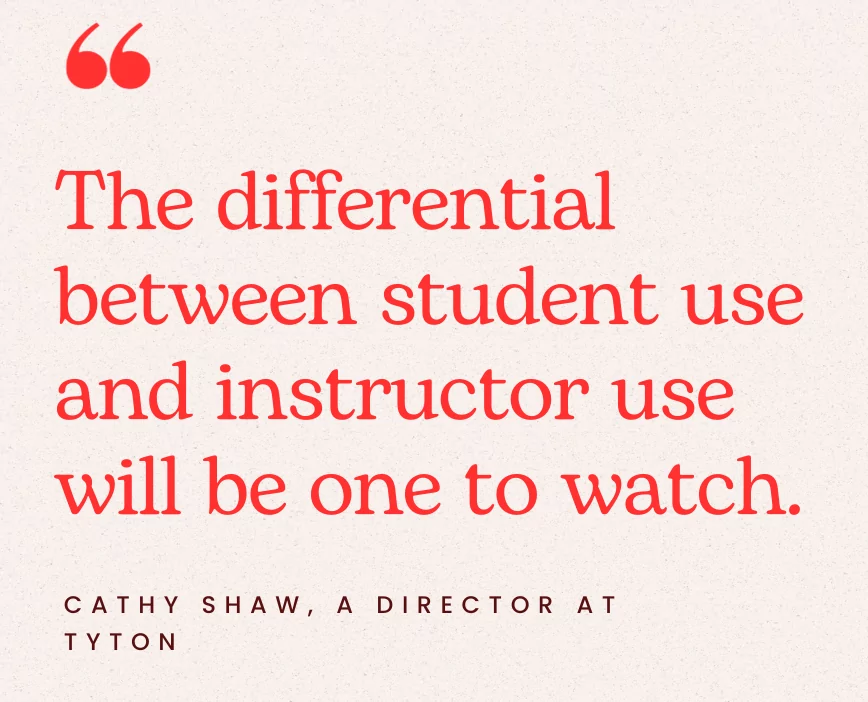A recent study by Tyton Partners has uncovered that while a significant number of students are rapidly adopting generative AI tools, faculty members lag behind in its use.

✅ AI Essay Writer ✅ AI Detector ✅ Plagchecker ✅ Paraphraser
✅ Summarizer ✅ Citation Generator
Key Takeaways:
- Over 49% of students use generative AI tools, whereas only 22% of faculty members utilize them.
- Faculty recognizes the importance of AI for the future workforce.
- Despite the rising adoption, AI policy-making remains inconsistent across institutions.
The Rise of AI in Academia
Generative AI has become a hot topic in academic discussions, particularly after the introduction of ChatGPT in November 2022. From an initial survey in March to the recent one in September, Tyton Partners has tracked the growing trend of AI tool usage in academia.
The adoption rate, defined as the daily, weekly, or monthly use of AI products, has witnessed a considerable increase for both faculty and students. Initially, in the spring, 9% of faculty and 27% of students used AI writing tools. By fall, the numbers jumped to 22% and 49%, respectively.

For students, daily usage of AI mainly revolves around summarizing or paraphrasing text, organizing schedules, and answering homework questions. Faculty, on the other hand, primarily use AI to understand student perspectives, teach effective AI usage, and design engaging in-class activities.
Interestingly, even if institutions or instructors banned AI tools, a significant portion of students would continue to use them. About 75% of student AI users and half of the non-users expressed a likelihood of persisting with the technology regardless of bans.
AI’s Role in Future Workforce
The study shed light on the perceived importance of AI in future professional settings. While 75% of faculty using AI believe students need to understand it for professional success, student opinion is divided. Only 55% of regular AI users and a third of non-users among students see it as essential for their future careers. Reflecting on the trend, Shaw commented, “It’s not AI that will take my job, it’s someone who knows how to use AI.”
Over time, faculty’s perceptions of AI’s impact on learning have become more positive. While 50% believed it would negatively affect student learning in spring 2023, this dropped to 39% by the fall. Student perspectives remained largely unchanged, with a slight increase in those viewing AI’s impact as negative.
The policy landscape, however, remains diverse and scattered. While some institutions have clear AI policies in place, others leave it to individual instructors or lack a policy altogether. Shaw emphasized the need for more clear-cut policies, especially in community colleges, as they play a pivotal role in student preparation for the workforce.
The Ethics of AI in Education
The integration of AI into academia has invariably brought to the forefront the critical issue of ethics. As AI tools become more embedded in educational processes, ethical concerns arise about how these tools shape learning, influence decision-making, and potentially perpetuate biases. The relevance of discussing ethics in AI education cannot be overstated, particularly in today’s fast-paced tech-centric world.
List of ethical considerations:
- Bias and Fairness: AI tools, including ChatGPT, are based on vast datasets. If these datasets have biases, the AI can inadvertently perpetuate or amplify them, potentially leading to unequal educational outcomes.
- Privacy and Data Security: With the use of AI in education, student data is frequently processed and analyzed. Ensuring this data is kept private and secure is paramount.
- Transparency: It’s essential for users to understand how AI tools make decisions or generate content. A lack of transparency can hinder trust and impede meaningful learning.
- Accountability: Who is responsible when an AI tool makes an error or when a student relies too heavily on it? Clear lines of accountability need to be established.
- Accessibility: As AI tools become more prevalent, ensuring that all students, regardless of their socio-economic backgrounds, have equal access to these tools is a significant concern.
- Dependence vs. Enhancement: While AI can be a valuable aid, there’s a thin line between students using it as a crutch rather than an enhancement to their learning process.
In summary, as the use of generative AI tools in academia surges, it’s imperative to address the ethical implications head-on. Only by doing so can institutions ensure that the adoption of such technologies leads to genuinely beneficial and equitable outcomes for all students.
Follow us on Reddit for more insights and updates.





Comments (0)
Welcome to A*Help comments!
We’re all about debate and discussion at A*Help.
We value the diverse opinions of users, so you may find points of view that you don’t agree with. And that’s cool. However, there are certain things we’re not OK with: attempts to manipulate our data in any way, for example, or the posting of discriminative, offensive, hateful, or disparaging material.